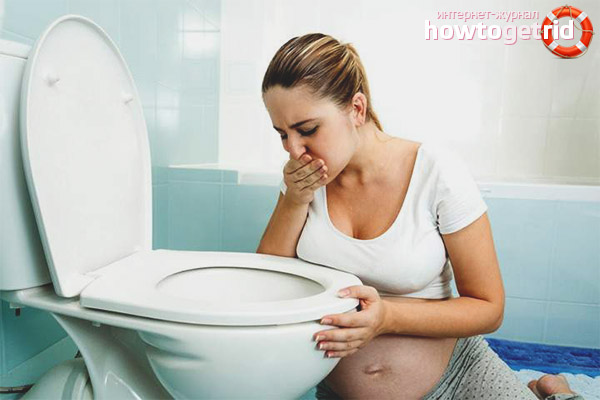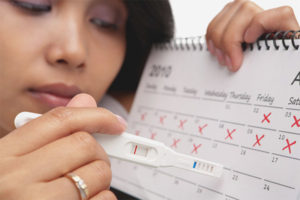The content of the article
Vomiting is a symptom often experienced by women during pregnancy, usually accompanied by toxicosis. However, vomit with blood is a sign of a dangerous pathological process, which can adversely affect the course of pregnancy and the formation of the fetus.
Causes of vomiting with blood during pregnancy
The formation of blood veins in the vomit can be caused by a number of reasons. Below are the most common ones.
Binge eating
Eating large amounts of food can lead to intestinal overload and vomiting. During the period of gestation, a similar condition in most cases is observed in the last weeks of pregnancy. The uterus grows actively and presses on the stomach, as a result of which its capacity becomes smaller.
Abuse of fatty, peppered, fried and other heavy meals increases the risk of developing vomiting at this time.
Impurities of blood are formed due to prolonged vomiting. Prolonged muscle spasm causes local damage to the mucous membranes of the esophagus and stomach, which is due to the acquisition of vomit reddish or brown color. In this condition, a pregnant woman feels symptoms such as nausea, pain in the epigastric region and general malaise.
Food poisoning
Poor quality food can lead to acute intestinal infectious disease (toxicoinfection), which is accompanied by vomiting. If the gastric mucosa is severely affected, blood can be seen in the vomit. Other clinical manifestations of food poisoning are:
- the development of vomiting 30-120 minutes after eating;
- nausea;
- the formation in the vomit of the remnants of undigested food;
- diarrhea;
- fever.
Vomiting and upset stools over time can cause dehydration, seizures, and loss of consciousness. A serious condition can cause a miscarriage in any month of pregnancy. If the expectant mother suspects food poisoning, she should visit a doctor immediately.
Gastrointestinal diseases
A stomach ulcer and 12 duodenal ulcer can lead to blood vomiting. In addition, these diseases are accompanied by the following clinical manifestations:
- nausea after eating;
- belching;
- heartburn;
- pain in the epigastric region.
The appearance of blood impurities in the vomit often signals the formation of bleeding from the ulcer. The color of the masses darkens. There is a sharp decrease in pressure, increased heart rate, shortness of breath occurs. When blood enters the intestines, the stool becomes black.
For perforation of a stomach ulcer, a symptom such as vomiting with blood is also characteristic. With this condition, not only the mucous membrane is damaged, but also other layers of the organ. In this case, the expectant mother feels severe acute pain in the stomach and sometimes can even pass out during an attack.
Another dangerous complication of an ulcer is penetration - a condition in which the pathological process spreads outside the affected organ. This phenomenon is also accompanied by the development of vomiting with blood. In this case, this symptom is very dangerous. If you do not provide medical assistance in a timely manner, a pregnant woman may develop peritonitis, even a fatal outcome is possible.
Oncology
The appearance of blood impurities in the vomit is a sign of such a dangerous disease as cancer of the stomach. Increasingly, the disease is detected in women at a young age, and bearing a child does not provide protection from it. On the contrary, changes in hormone levels and body restructuring, characteristic of pregnancy, can cause a rapid growth of neoplasms and bleeding. The clinical manifestations of stomach cancer include the following:
- intolerance to certain products;
- bouts of nausea;
- stomach pain not related to eating;
- general deterioration of well-being.
Signs of cancer are not characteristic and can be observed in various diseases. A correct diagnosis can only be made after a comprehensive examination. For diagnosis, you need to conduct such studies as a biopsy of the gastric tissues and FGDS. Pregnant women are rarely referred for such studies and only in situations where, according to doctors, the possible benefits for the expectant mother are higher than the risk for the child.
Vomiting with blood in early pregnancy
Vomiting in the first weeks of gestation is the main symptom of toxicosis. In addition to him, the expectant mother notices such signs:
- loss of appetite;
- nausea (especially in the morning);
- intolerance to certain foods and odors;
- increased salivation;
- drowsiness;
- lethargy.
The formation of blood inclusions in the vomit occurs due to severe toxicosis, if vomiting is very frequent, nausea persists for a whole day. A pregnant woman’s body weight decreases, and symptoms of dehydration occur (dry skin, thirst, rare urination). Blood in the vomit appears as a result of trauma to the mucous membrane of the esophagus or stomach due to severe vomiting. In this condition, the expectant mother must be hospitalized in order to conduct treatment in a hospital.
Such a symptom at the beginning of pregnancy may indicate an exacerbation of the ulcer. Against the background of toxicosis, the appearance of bleeding from an old ulcer and the appearance of the remaining symptoms of this disease are not ruled out.
Vomiting blood in the last weeks of pregnancy
In the third trimester, vomiting with blood can also occur. Sometimes this condition is observed in the last month of pregnancy. At this time, the cause most often becomes the increased pressure of the uterus with a growing fetus on the internal organs, including the stomach. Even usual overeating can cause the development of vomiting with blood at this time.
Particular danger at this time is preeclampsia, which develops as a result of the fact that the mother’s body capabilities are not enough to fully supply the child with oxygen and nutrients, which causes hypoxia.
Gestosis in late pregnancy is accompanied by symptoms such as the appearance of edema, headaches, increased blood pressure, vomiting with blood. The danger of this phenomenon is that it can cause fetal hypoxia, premature birth or complications during childbirth.
First aid
If the future mother has vomiting with blood, it should:
- put it on its side;
- put a basin nearby in case the attack recurs;
- from time to time measure blood pressure, pulse, monitor respiratory rate;
- Offer a large amount of warm drink to a pregnant woman to prevent dehydration.
Treatment
- therapist;
- gastroenterologist;
- gynecologist.
With drug therapy, drugs are tried that will not harm the fetus. The following medicines are used:
- sorbents - Polysorb, Smecta;
- antiviral agents - Anaferon, Arbidol;
- enzymes - Festal, Mezim;
- means to support the liver - Lecithin, Hofitol.
The doctor must choose the type of medicine and dose, self-medication during pregnancy is strictly prohibited.
Important! You should adjust the diet, drink more fluids.
Vomiting with blood in pregnant women is rare. If a similar symptom appears, in no case should you prescribe yourself a treatment yourself, so as not to harm the child. The doctor will prescribe the necessary examinations and, based on their results, select the appropriate therapy.
Video: how to survive severe toxicosis











Submit